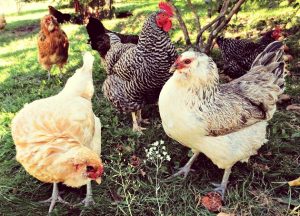A growing number of chickens and other live poultry are moving from farms to backyards — as pets, producers of fresh eggs, and, if you really want to get your hands dirty, as providers of fertilizer (think chicken poop).
But their rise in popularity has brought a rise in health risks, particularly from illnesses caused by salmonella bacteria.
The CDC says eight ongoing outbreaks of salmonella are linked to backyard chickens. These outbreaks have sickened 611 people, including 195 children under the age of 5, across 45 states since Jan. 4. Because most cases go unreported, the actual number of illnesses may be as high as 10,000, according to the CDC.
Salmonella infections most often cause diarrhea, stomach cramps, and fever — symptoms which can last up to a week. Most people get better without treatment. But children under the age of 5, adults over 65, people with chronic illnesses, people with weakened immune systems, and pregnant women have a higher risk of severe salmonella infections.
“Direct contact with chicks, chickens, ducklings, ducks, geese, and turkeys or contact with their environment can make people sick with salmonella infections,†says Megin Nichols, DVM, a veterinarian with the CDC. “Poultry can have salmonella in their droppings and on their feathers, feet, and beak, even though they appear healthy and clean.â€
There have been 65 salmonella outbreaks linked to backyard poultry since 1991. The CDC says the 2016 outbreaks “involve the largest number of sick people linked to live poultry that we’ve seen.â€
The CDC is trying to pinpoint what types of contact caused the most illnesses in the recent outbreaks. In the past, baby chicks have been the source. Keeping baby chicks in the house, snuggling them, and kissing them are no-nos.
Experts say since you can’t be sure that your flock does not harbor salmonella, you should treat it as if it does. Salmonella is part of their gut bacteria, Nichols says of chickens and other live poultry. “It is something that’s found in their intestines that doesn’t necessarily make poultry sick. The best thing to do is assume that salmonella germs are present.â€
Poultry carrying the bacteria will shed it in droppings as well as onto feathers and feet. That means you could come into contact with it anywhere you keep your birds.
Elizabeth Wren Shiffler, a real estate agent in Portland, OR, has been raising chickens for years, both for their eggs and for their help in the garden. She says she holds and pets her birds occasionally to maintain a social bond with them, but she washes her hands after each contact and has yet to have a problem with salmonella.
“We like eggs, and chickens are where [eggs] come from,†says Shiffler, 38, “so you have to take care to make sure your eggs are well cooked and your hands are kept clean and your chickens’ nesting boxes are kept as clean as possible.â€
Washing your hands is one of the top ways experts suggest to protect yourself.
After you handle live poultry, feed live poultry, or touch its backyard coop or living space, wash your hands vigorously for 20 seconds or more with soap and water, then dry them with a clean towel.
Have an alcohol-based hand sanitizer handy in case you can’t get to a sink right away, says Elizabeth Scott, PhD, co-director of the Center for Hygiene and Health at Simmons College in Boston.
“If possible, wash your hands outdoors, not at the kitchen sink,†Scott says. “You do not want to be rinsing salmonella off your hands and into the kitchen sink, and you don’t want to use the kitchen sponge or dishrag either. The salmonella can proliferate in both.â€
You should also clean any feeding dishes or other equipment outside.
Do not bring them indoors.
Experts also offer these tips to prevent infection:
Wear proper clothes: Pick out clothing and a pair of boots or shoes that you will wear only when tending your flock, advises Scott, who grew up on a farm. Keep it outside.
After cleaning your coop, separately wash the clothes you wore in your machine’s hot water cycle. (Wash yourself as well! A hot shower will do the trick.)
Set barriers: Chickens and other live poultry belong in the yard, not in the house, and especially not in the kitchen or any room where you store, prepare, and serve food, Scott says.
Says Nichols: “The poultry have their area, you have your area, and you keep it that way. That will definitely help prevent infection.â€
Supervise your children:
Children under the age of 5 should not have any direct contact with live poultry, Nichols says. Their immune systems cannot protect them enough from infection. Also, they are much more likely to put their fingers in their mouths.
Keep a close eye on older children to be sure that they don’t put their fingers in their mouths and that they wash their hands thoroughly after handling poultry.
No kissing: Don’t let a baby chick’s cuteness fool you into thinking it’s free of disease, Scott warns. “It’s better not to kiss them.â€
Handle eggs properly: When you collect your flock’s eggs, which you should do at least once a day, rinse them in water that’s warmer than the eggs themselves.
The warm water causes the shell to expand slightly, which helps push dirt out of pores on the shell. Don’t let them sit in the water. Use a detergent made for egg washing if your eggs are dirty. Dry them and store large side up in the refrigerator.
When you’re ready to eat, make sure to cook your eggs thoroughly. “The salmonella bacteria are actually in the yolk,†Scott says. “That’s why we shouldn’t eat raw or undercooked eggs.â€





